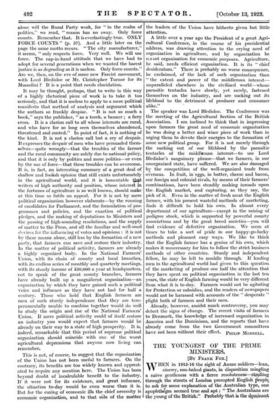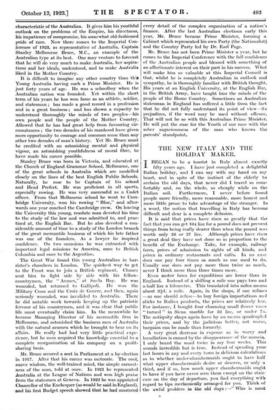THE YOUNGEST OF THE PRIME 'MINISTERS.
My FRANK Fox.] WHEN in 1915-16 the sight of Anzac soldiers—lean, sinewy, sun-baked giants, in disposition mingling a naive gentleness with a fierce resoluteness—strplling through the streets of London prompted English iSeopil. to ask fOr some explanation of the Australian type, one apophthe-gm seemed true and apt The Australians are the young of the British:). Probably that is the dominant characteristic of the Australian. It gives him his youthful outlook on the problems of the Empire, his directness, his impatience of compromise, his somewhat old-fashioned pride of race. Now there comes to the Imperial Con- ference of 1923, as representative of Australia, Captain Stanley Melbourne Bruce, M.C., an example of the Australian type at its best. One may venture to forecast that he will do very much to make Australia, her aspira- tions and her ideals, understood, and to make Australia liked in the Mother Country. It is difficult to imagine any other country than this Young Australia having such a Prime Minister. He is just forty years of age. He was a schoolboy when the Australian nation was founded. Yet within the short term of his years he has won fame as an athlete, soldier, and statesman ; has made a good record in a profession and in a great business ; and has shown a capacity to understand thoroughly the minds of two peoples—his own people and the people of the Mother Country. Allowed that he has had great help from favouring cir- cumstances; the two decades of his manhood have given more opportunity to courage and common sense than any other two decades of man's history. Yet Mr. Bruce must be credited with an astonishing mental and physical vigour, an astonishing youthfulness of moral fibre, to have made his career possible. Stanley Bruce was born in Victoria, and educated at the Church of England Grammar School, Melbourne, one of the great schools in Australia which are modelled closely on the lines of the best English Public Schools. Naturally, he rose to be Captain of his school and Head Prefect. He was proficient in all sports, especially rowing. He was very successful as a Cadet officer. From that Melbourne school he went to Cam- bridge University, won his rowing "Blue," and after- wards one year coached the Cambridge crew. On leaving the University this young, resolute man devoted his time to the study of the law and was admitted to, and prac- tised at, the English Bar. But he also devoted a con- siderable amount of time to a study of the London branch of the great mercantile business of which his late father was one of the founders. As a lawyer he inspired confidence. On two occasions he was entrusted with important legal missions to America, once to British Columbia and once to the Argentine.
The Great War found this young Australian in bar- rister's chambers in London. The quickest way to get to the Front was to join a British regiment. Chance sent him to fight side by side with his fellow- countrymen, the "Anzacs," at Suvla Bay. He was wounded, but returned to Gallipoli. He won the Military Cross and the Croix de Guerre, and then, again seriously wounded, was invalided to Australia. There he did notable work towards keeping up the patriotic fervour of his countrymen, and it was clear that public Life must eventually claim him. In the meanwhile he became Managing Director of his mercantile firm in Melbourne, and astonished the business men of Australia with the natural acumen which he brought to bear on its affairs. He really had had very little practical expe- rience, but he soon acquired the knowledge essential to a complete reorganization of his company on a profit- sharing basis.
Mr. Bruce secured a seat in Parliament at a by-election in 1917. After that his career was meteoric. The cool, suave wisdom, the well-trained mind, the simple earnest- ness of the man, told at once. In 1921 he represented Australia at the League of Nations and won high praise from the statesmen at Geneva. In 1922 he was appointed Chancellor of the Exchequer (as would be said in England), and his first Budget speech showed that he had mastered every detail of the complex organization of a nation's finance. After the last Australian elections early this year, Mr. Bruce became Prime Minister, forming a Cabinet which represented his own Party (the Nationalist) and the Country Party led by Dr. Earl Page. Mr. Bruce has not been Prime Minister a year, but he comes to the Imperial Conference with the full confidence of the Australian people and blessed with something of an affectionate interest on their part in his success. What will make him so valuable at this Imperial Council is that, whilst he is completely Australian in outlook and sympathy, he is thoroughly familiar with British thought. His years at an English University, at the English Bar, in the. British Army, have taught him the minds of the people of the Home Country. Sometimes an Australian statesman in England has suffered a little from the fact that he did not fully understand its point of view—its prejudices, if the word may be used without offence. That will not be so with this Australian Prime Minister. He will put the case for the Youth of our race with the sober sagaciousness of the man who knows the. parents' standpoint.



























































 Previous page
Previous page